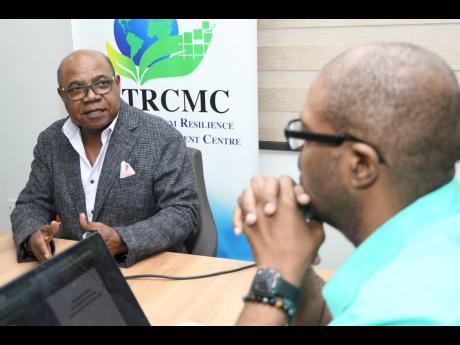No COVID tug-of-war in tourism, says Bartlett
Denying that there is tension in the hotel sector over the Government’s COVID-19 containment measures, Tourism Minister Ed Bartlett says some players are merely anxious for normality having witnessed other countries lift restrictions, easing the pressure on a severely battered hospitality industry.
“There isn’t a tug of war. I think that we’re looking at how each of our competitive destinations is responding to the pandemic and we’re always anxious to get the lion’s share of the visitors that come into our region,” Bartlett told journalists at Tuesday’s Global Tourism Resilience and Crisis Management Centre luncheon at The University of the West Indies in St Andrew.
Sandals Resorts International Chairman Adam Stewart set off a firestorm on social-media platform Twitter at the weekend, commenting that inoculation against COVID-19 is a personal choice.
Stewart, one of the largest private-sector employers in the Caribbean, is also in favour of the scrapping of face masks, a measure the Government remains firm on in its fight against the spread of the virus.
“It’s going to be a long road ahead if more leaders don’t take a page out of [Prime Minister Boris] Johnson’s book,” Stewart tweeted on January 19, referencing the United Kingdom’s decision to abandon key COVID-19 measures.
He also expressed support for the World Health Organization’s advice to countries to lift travel bans and not ask for proof of vaccination before entry.
But other players in the industry have been more cautious, key among them Couples Resorts Chairman Lee Issa, who said the lifting of protocols should be guided by medical experts.
Bartlett agreed, but said that the challenge remained with the country’s vaccination rate of only 21 per cent, calling the unvaccinated the “inhibiting factor” in the slow roll-up of the protocols.
“It is not so much the fact of whether the Government does this or the Government does that. A lot of it is dependent on what we do,” he said, adding that the vaccination rate has been the “single most deleterious impact that tourism has had”.
He stressed that visitors will not be comfortable interacting with unhealthy Jamaicans, irrespective of where Resilient Corridors, Jamaica’s hospitality bubble, exist.
Jamaica saw 1.6 million visitors coming into the island last year, earning just over US$2 billion.
Bartlett said the recovery against 2019 fell just below 70 per cent for stopover arrivals, but the continued drag in the cruise ship market has impacted the overall average, putting it at approximately 54 per cent.
He said the year is off to a soft start relative to what was anticipated, noting that the Omicron variant of COVID-19 is to blame, with January recording a 23 per cent decline when compared to 2019.
The drop-off in arrivals continues to impact hoteliers in the capital city who remain outside of the tourism ministry’s Resilient Corridor.
Pressed on the possible expansion of the corridor to include Kingston, Bartlett said his hope is that the general restrictions implemented across the island will be “released” with improvement in the Government’s management of the pandemic and the retreat of Omicron.
“What we want to see is the entire country getting back to the point where we were, which is normalcy. Normalcy will dictate that we don’t need to have Resilient Corridors, but as long as we remain within the pandemic, Resilience Corridors are going to be a feature,” citing its impact on confidence among tourists.
On Tuesday, the Jamaica Hotel and Tourist Association (JHTA) said it believes that the health and safety measures, restrictions, and vaccination programme work well to limit the spread of COVID-19.
The JHTA said that the country must remain committed to ensuring that nothing compromises the well-being of Jamaicans.
“We must, therefore, strike the right balance between the relaxation of measures and the stability of our healthcare system. The JHTA affirms its commitment to working with the Ministry of Health to find the safest pathway to recovery while protecting lives and maintaining livelihoods,” it said.

